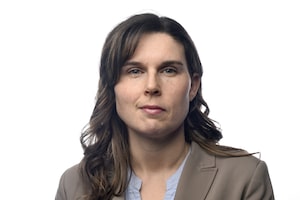Tournament director Karl Hale was born in Falmouth, Jamaica, and came to Canada with his mother and two siblings when he was nine.Darren Calabrese/The Globe and Mail
Karl Hale is, quite simply, a connector of people.
Ask anyone who knows the gregarious Toronto Rogers Cup tournament director and the first thing gleaned is "Karl knows everyone." He put Sidney Crosby in the same room with Roger Federer, teamed the Williams sisters on a doubles court with Jamaican sprinters Yohan Blake and Warren Weir and persuaded six-time Olympic gold-medalist Usain Bolt, another Jamaican, to pick up a racquet and hit with Marion Bartoli.
That easy congeniality is a quality that's essential to the success even of a big-purse Masters 1000 tennis tournament such as the Rogers Cup. There are so many other events that players can play, and so many other commercial demands on their time. And sure, the money's huge, but players like the personal touch. So that's why the silver-haired Hale can be seen everywhere this week around the Rogers Cup grounds, often flanked by a top player such as Andy Murray or Novak Djokovic. Who else but Hale could get Federer to play in a ball-hockey event this week?
"Karl Hale is our secret weapon," said Kelly Murumets, Tennis Canada's new president and chief executive officer. "You won't hear him talk about himself, but everyone else will tell you how Karl just won a big tennis tournament or how he was playing tennis with Sir Richard Branson or, oh, he's just on the phone with Rafa. Every time I'm with a player's agent, I hear about how relentless Karl Hale is, and how much they love him."
All true, but you have to press Hale before he dishes up any anecdotes.
"Richard Branson has an event called the Necker Cup on his island – Necker Island – and I went and honestly, it was like a dream – didn't even seem like reality, just gorgeous white sandy beaches. I really never live like that," says Hale. "I went to the tennis courts and there was Nadal warming up, then I see Becker, Edberg at a restaurant, Bartoli, Navratilova. It was like a pro-am on speed, the best ever."
Hale takes no credit for the fact that ticket sales for both women's and men's Rogers Cups have spiked "like the upward curve of a hockey stick." That, he said, is due to the recent Grand Slam successes of Eugenie Bouchard and Milos Raonic.
In a previous year at the men's event, the clamour would be for Federer or Nadal. "But what's more significant is people [in Toronto] are all asking for Milos, sponsors all want to engage with him and everyone is engaged at a deeper level because of Milos," said Hale. "If weather is good and the stars play far into the tournament, I think we'll have attendance records here in Toronto this year."
Hale was born in Falmouth, Jamaica, and came to Canada with his mother and two siblings when he was nine. He took up tennis at 13, went on to play in the Davis Cup for Jamaica and on minor professional tours, launched his coaching career in Japan and then worked his way up from coaching at small Toronto-area clubs to become the head of Canada's Federation Cup staff. Along the way, he regularly returned to native country, where as a boy he had seen other kids who lived with so little. Today, he uses his celebrity connections to raise money, build schools and promote tennis participation there.
"When I was a kid, I noticed the divisive line between the haves and have-nots in Jamaica," said Hale, settling in for an interview in the Rogers Cup players' lounge. "They couldn't go to doctors, they didn't have shoes, their teeth were bad, their clothes were ripped, they lived in a tiny house or shack, but we were still friends and played together. But as I grew older, I noticed they had no opportunity and it wasn't their fault. So helping people in Jamaica has become my main mission now, and takes up most of my days."
Hale says it often surprises people to learn he is Jamaican-Canadian, a white man who speaks with no noticeable accent. But Hale reminds people that there are people of many skin colours in Jamaica, and his parents and grandparents had been born there. When his parents separated, his mother brought Hale and his sister and brother to Canada. At 13, he was late to start in tennis compared to many others – his brother, who was 10 years older, had earned a tennis scholarship to Old Dominion University in Virginia.
"He would take me out to play in the summers, and I always thought I could beat him, but it never happened," said 46-year-old Hale. "But it gave me the tennis bug."
In 2003, he landed a job as head pro at Donalda Club, one of Toronto's most prestigious golf and tennis clubs, and he took over as Rogers Cup tournament director in 2006. Along the way, having made tennis relationships all over the world, he started to put them to use raising money for causes. He helped Canadian doubles star Daniel Nestor start up a charity to raise money for North York General Hospital, and he wanted to start one of his own in Jamaica.
So he began Helping Hands Jamaica. It raises funds with galas and walk-a-thons, and has built seven new schools in Jamaica.
"A dollar goes so much further there than it does here in Canada," said Hale. "I have good relationships with the tourist board in Jamaica, and the island isn't that big, so people know me there. And I like to show people a good time in my homeland."
 Rachel Brady
Rachel Brady